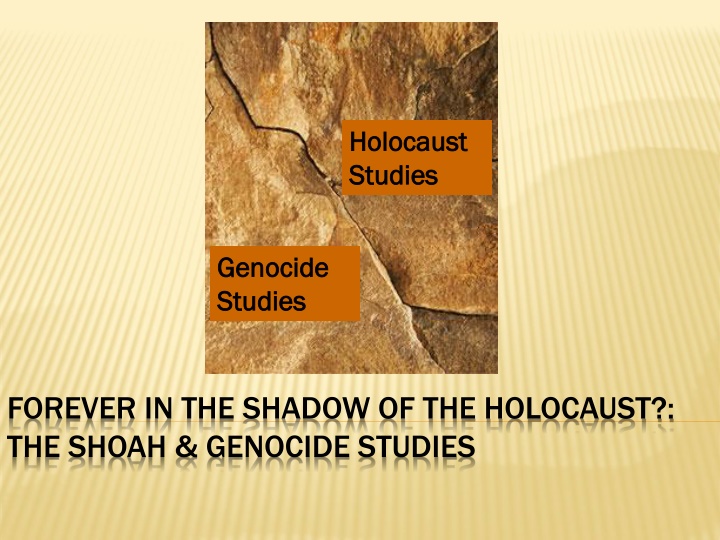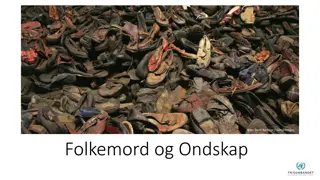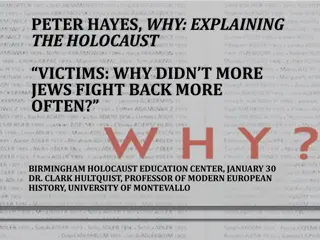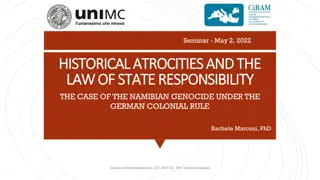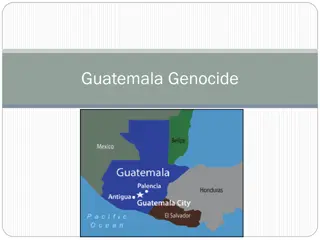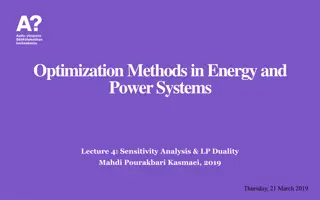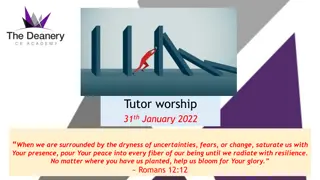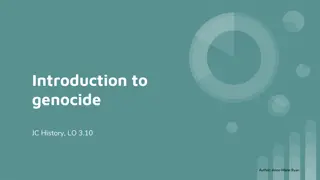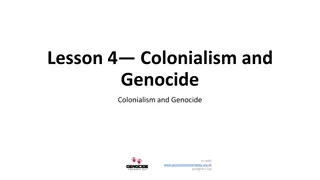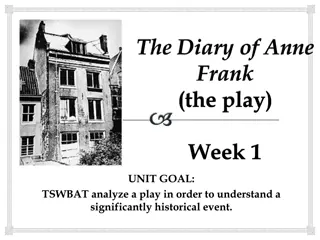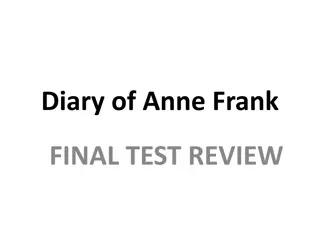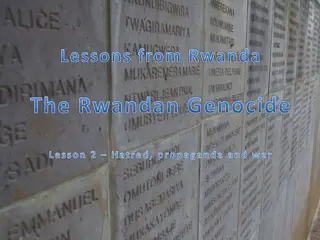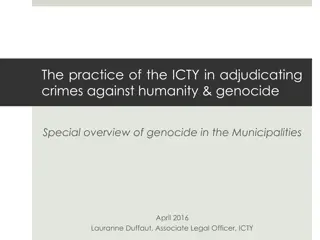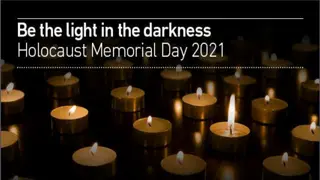Forever in the Shadow of the Holocaust: The Shoah & Genocide Studies
"Exploring the intertwined history of the Holocaust and genocide studies, this in-depth text delves into the etymology of genocide, the significant role of Raphael Lemkin, and the complex relationship between studying the Holocaust and other genocides. It discusses the nuances of comparing genocides to the Holocaust and the ongoing debate surrounding the uniqueness and recognition of different genocides."
Download Presentation

Please find below an Image/Link to download the presentation.
The content on the website is provided AS IS for your information and personal use only. It may not be sold, licensed, or shared on other websites without obtaining consent from the author.If you encounter any issues during the download, it is possible that the publisher has removed the file from their server.
You are allowed to download the files provided on this website for personal or commercial use, subject to the condition that they are used lawfully. All files are the property of their respective owners.
The content on the website is provided AS IS for your information and personal use only. It may not be sold, licensed, or shared on other websites without obtaining consent from the author.
E N D
Presentation Transcript
Holocaust Holocaust Studies Studies Genocide Genocide Studies Studies FOREVER IN THE SHADOW OF THE HOLOCAUST?: THE SHOAH & GENOCIDE STUDIES
A SHARED HISTORY & SHARED FUTURE? Raphael Raphael Lemkin The etymology of genocide: The etymology of genocide: Genos cide cide (Latin: killer) (Latin: killer) Axis Rule in Occupied Europe Axis Rule in Occupied Europe (1944) UN Resolution 260 UN Resolution 260- - On the Prevention and On the Prevention and Punishment of the Crime of Genocide Punishment of the Crime of Genocide A symbiotic partnership or an unequal relationship? A symbiotic partnership or an unequal relationship? Lemkin- - The father of Genocide Studies The father of Genocide Studies Genos (Greek: race) and (Greek: race) and (1944) The relationship between study of the Holocaust and study of The relationship between study of the Holocaust and study of genocide warrants reflection, because it has been both negative and genocide warrants reflection, because it has been both negative and positive, characterized variously by synergies, processes of self positive, characterized variously by synergies, processes of self- - definition by mutual exclusion, and occasional resentment. definition by mutual exclusion, and occasional resentment. Dirk Moses, Dirk Moses, The Oxford Handbook of Genocide Studies The Oxford Handbook of Genocide Studies
PLACING THE HOLOCAUST & GENOCIDE Unique Unique Paradigmatic Paradigmatic Exemplar Exemplar Many scholars of other genocides still live under the sign Many scholars of other genocides still live under the sign of uniqueness by contesting or just resenting it, or . . . of uniqueness by contesting or just resenting it, or . . . attempting to make attempting to make their genocides look exactly like the their genocides look exactly like the Holocaust in order to gain the attention or even basic Holocaust in order to gain the attention or even basic recognition that many of them still lack recognition that many of them still lack. . Donald Donald Bloxham Bloxham Comparative Comparative genocide studies was born into the genocide studies was born into the opposition to the dominant Holocaust opposition to the dominant Holocaust discourse. . . an act of revolt has largely informed the subsequent development of revolt has largely informed the subsequent development of the field and its unduly militant character of the field and its unduly militant character. discourse. . . an act . Anton Weiss Anton Weiss- -Wendt Wendt
A CANON OF GENOCIDE? Cambodia (1975 Cambodia (1975- -79) 79) Armenia (1915 Armenia (1915- -18) 18) Holocaust (1939 Holocaust (1939- -45) 45) Rwanda (1994) Rwanda (1994)
POINTS TO PONDER Why is the term genocide so important? Why is the term genocide so important? Legal reasons Legal reasons Symbolic reasons Symbolic reasons Political reasons Political reasons Moral reasons Moral reasons Does it need to be genocide to be important? Does it need to be genocide to be important? Ethnic cleansing Ethnic cleansing War crimes War crimes Mass killing/atrocity Mass killing/atrocity
OTHER GENOCIDES? the CEH [Commission for Historical the CEH [Commission for Historical Clarification] concludes that agents of Clarification] concludes that agents of the state of Guatemala, within the the state of Guatemala, within the framework of counterinsurgency framework of counterinsurgency operations carried out between 1981 operations carried out between 1981 and 1983, committed acts of and 1983, committed acts of genocide against groups of Mayan genocide against groups of Mayan people. people. When a child was forcibly removed that child s When a child was forcibly removed that child s entire community lost, often permanently, its entire community lost, often permanently, its chance to perpetuate itself in that child. The chance to perpetuate itself in that child. The Inquiry has concluded that this was a primary Inquiry has concluded that this was a primary objective of forcible removals and . . . amount to objective of forcible removals and . . . amount to genocide. genocide. Bringing them Home Bringing them Home
POINTS OF FRACTURE OR DIFFERENCE? (1) (1) disciplinary disciplinary and methodological and methodological orientation orientation (2) (2) political political activism and activism and advocacy advocacy (3) (3) linguistic linguistic and definitional and definitional issues issues (4) (4) political political ideology ideology
A DISCIPLINARY FRACTURE? Social Scientists vs. Historians Sample size (n) Sample size (n) Theory versus practice Theory versus practice The comparative approach The comparative approach Social Scientists vs. Historians [the] discipline s predominant social science [the] discipline s predominant social science- -positivistic orientation orientation is frequently directed is frequently directed toward discerning commonalities and general principles about the phenomenon of genocide, a bias and general principles about the phenomenon of genocide, a bias that is in keeping with a normative commitment to prevention. that is in keeping with a normative commitment to prevention. positivistic toward discerning commonalities Alexander Hinton Alexander Hinton to rely on the insights afforded by just one genocide is to to rely on the insights afforded by just one genocide is to parochialize parochialize genocide scholarship and condemn it to a corpus of genocide scholarship and condemn it to a corpus of disconnected monographic studies. disconnected monographic studies. Henry Henry Huttenbach Huttenbach
THE LIMITS OF SOCIAL SCIENCE? Sociology inherently has a difficult time dealing with Sociology inherently has a difficult time dealing with unique events such as Hiroshima, Vietnam, or the unique events such as Hiroshima, Vietnam, or the Holocaust. It is a generalizing discipline, very Holocaust. It is a generalizing discipline, very uncomfortable with the idiosyncratic, the singular, the uncomfortable with the idiosyncratic, the singular, the aberrational. Sociology must immediately place such an act aberrational. Sociology must immediately place such an act into a category, comparable to other similar events. into a category, comparable to other similar events. Sociologists are not only uncomfortable with uniqueness; Sociologists are not only uncomfortable with uniqueness; they are conceptually hostile to the exceptional, to non they are conceptually hostile to the exceptional, to non- - conforming events. . . . In part this is because the conforming events. . . . In part this is because the Holocaust also makes one confront m Holocaust also makes one confront moral sociology is not comfortable with that either, being a sociology is not comfortable with that either, being a secular, non secular, non- -moralizing science moralizing science. For all these reasons, there is little to date in Holocaust literature by sociologists there is little to date in Holocaust literature by sociologists. oral issues, and issues, and . For all these reasons, . Sociologist Jack Sociologist Jack Nusan Nusan Porter Porter
THE ACTIVISTS DILEMMA Preventive intervention is key Preventive intervention is key Responsibility to Protect (R2P) Responsibility to Protect (R2P) Policy Policy- -centric versus history centric versus history- -centric centric Scholars of genocide sometimes have the tendency to be Scholars of genocide sometimes have the tendency to be rather self rather self- -congratulatory, as if those who do not spend congratulatory, as if those who do not spend their lives researching, writing about or actively trying to their lives researching, writing about or actively trying to prevent genocide are any less concerned about its prevent genocide are any less concerned about its occurrence occurrence. . In a similar sense, In a similar sense, the field of Genocide Studies itself suffers from a scholar Studies itself suffers from a scholar- -activist divide that sometimes sometimes spills over into unattractive internecine debates spills over into unattractive internecine debates about the correct relationship between academic research about the correct relationship between academic research and political activism and political activism. . the field of Genocide activist divide that Dan Stone Dan Stone
POINTS TO PONDER Do definitions matter? Do definitions matter? Do definitions matter with respect to genocide? Do definitions matter with respect to genocide? Do we have a definition of genocide? Do we have a definition of genocide? Do we need others? Do we need others?
UN RESOLUTION 260 (9 DEC 1948) In the present Convention, genocide means any of the following In the present Convention, genocide means any of the following acts acts committed with intent committed with intent to destroy, in whole or in part, a to destroy, in whole or in part, a national, ethnical, racial or religious group, as such national, ethnical, racial or religious group, as such: : Killing members of the Killing members of the group; group; Causing Causing serious bodily or mental harm to members of the serious bodily or mental harm to members of the group; group; Deliberately Deliberately inflicting on the group conditions of life calculated inflicting on the group conditions of life calculated to bring about its physical destruction in whole or in to bring about its physical destruction in whole or in part; part; Imposing Imposing measures intended to prevent births within the measures intended to prevent births within the group; group; Forcibly Forcibly transferring children of the group to another group. transferring children of the group to another group.
WHATS IN A DEFINITION? Mens Mens rea Intent versus effects? Intent versus effects? State versus non State versus non- -state actors Requiring Requiring proof of a deliberate plan [i.e., specific intent] proof of a deliberate plan [i.e., specific intent] and individual culpability imposes strict limits on cases that and individual culpability imposes strict limits on cases that qualify as genocide . . . the strict legal analysis makes early qualify as genocide . . . the strict legal analysis makes early identification impossible and prevention a moot point identification impossible and prevention a moot point. Sheri Rosenberg & Sheri Rosenberg & Everita There is no simple response to the problem of definitional There is no simple response to the problem of definitional proliferation and its consequences, and it is unlikely that proliferation and its consequences, and it is unlikely that scholars and activists will settle on a single definition. scholars and activists will settle on a single definition. rea and and actus actus reus reus state actors . Everita Silina Silina Joyce Joyce Apsel Apsel & Ernesto & Ernesto Verdeja Verdeja
BROADENING THE DEFINITION? While recognizing that all definitions have While recognizing that all definitions have weaknesses, we might weaknesses, we might simply define genocide simply define genocide as the as the more or less coordinated attempt to more or less coordinated attempt to destroy a dehumanized and excluded group of destroy a dehumanized and excluded group of because of who they because of who they are. . . . opening are. . . . opening the door to cultural genocide, genocide committed by to cultural genocide, genocide committed by non non- -state agents, genocide by neglect, and state agents, genocide by neglect, and genocide of political, economic, social and other genocide of political, economic, social and other groups groups as constituted in specific historical and as constituted in specific historical and cultural contexts cultural contexts. . the door Alexander Hinton Alexander Hinton
PREFIXING GENOCIDE? Politicide Politicide (Barbara Gendercide Gendercide (Adam Jones) Gynocide Gynocide (Mary Daly) Democide Democide (R.J. Ethnocide Ethnocide (Helen Fein and Israel (Helen Fein and Israel Charny Indigenocide Indigenocide (Raymond Evans & Bill Thorpe) (Raymond Evans & Bill Thorpe) Structural genocide Structural genocide (Patrick Wolfe) Cultural Cultural genocide genocide (Raphael (Barbara Harff Harff) ) (Adam Jones) (Mary Daly) (R.J. Rummel Rummel) ) Charny) ) (Patrick Wolfe) (Raphael Lemkin Lemkin) )
THE ROLE OF POLITICAL IDEOLOGY? The Holocaust & Israel Israel & Palestine Israel & Palestine The The Nakba Nakba & the Shoah & the Shoah Genocide as a political tool? Genocide as a political tool? [T]he metaphoric reference to the Holocaust exists within the [T]he metaphoric reference to the Holocaust exists within the metaphoric system of the Israeli metaphoric system of the Israeli- -Palestinian struggle, On both sides Palestinian struggle, On both sides of the conflict, thus Holocaust of the conflict, thus Holocaust- -related metaphors are used mainly as related metaphors are used mainly as a form or voice, aimed to convey the community s suffering and its a form or voice, aimed to convey the community s suffering and its justification for action. justification for action. Ruth Linn Ruth Linn The Holocaust & Israel . . . We should view Israel s destruction of large parts of Arab society in 1948 not . . . We should view Israel s destruction of large parts of Arab society in 1948 not simply through the perspective of settler simply through the perspective of settler- -colonial genocide, but as an extension of colonial genocide, but as an extension of the exclusivist nationalism which had brought about extensive genocidal violence in the exclusivist nationalism which had brought about extensive genocidal violence in the European war . . .[this] included the development of an incipient genocidal the European war . . .[this] included the development of an incipient genocidal mentality towards Arab society. mentality towards Arab society. Sociologist Martin Shaw Sociologist Martin Shaw
